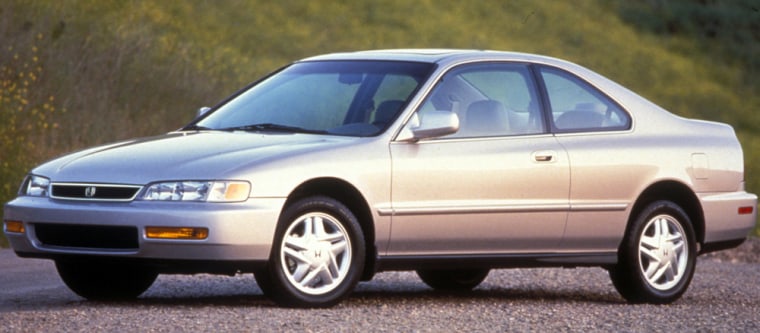Auto theft is down nationwide, but old Honda Accords and Civics are still being filched for their parts.
Just because your Honda is a clunker doesn't mean it's safe to leave it unlocked while you make a coffee run.
Approximately 1 million vehicles are stolen nationwide every year, but the 1994 Honda Accord is the most stolen car, according to an recent report by the National Insurance Crime Bureau. Last year, more than 55,000 Accords were stolen in the U.S. Needless to say, the thieves aren't after style, just substance.
Older vehicles like the 15-year-old Accord are pinched so often because their lack of theft-deterrent technology makes them easy to access and their parts — headlights, tires, catalytic converters and anything containing copper — are valuable on the black market. It also comes down to pure numbers, says Frank Scafidi, a spokesman for the National Insurance Crime Bureau: "Hondas and Toyotas, they sell millions of these things, so there are more targets, obviously."
Most neighborhood hooligans wouldn't know how to steal a Lamborghini, but when it comes to more mundane rides they are equal-opportunity snatchers, Scafidi says. The vehicles most likely to get nabbed range from the tiny Honda Civic, ranked second on our list, to the fifth-ranked Dodge Ram pickup. Even minivans aren't immune — the 2000 Dodge Caravan is a hot target as well.
To find out which cars are the most likely to be stolen, we consulted data from the National Insurance Crime Bureau, a nonprofit group in Des Plaines, Ill., devoted to preventing insurance fraud and vehicle theft. Its Hot Wheels 2009 study determined the vehicle make, model and year for every car reported stolen to the National Crime Information Center, a division of the FBI.
The results are a preliminary quantity — the NCIC will release the final crime report later this month — but 2008 is on track to become the fifth consecutive year of declining auto thefts in the U.S. If the figures hold, total thefts will be less than 1 million vehicles — the lowest annual total in at least 20 years.
That's good news in a tough economy, because crime is expensive. According to FBI data, between $7 billion and $8 billion is lost every year due to auto theft. In 2007, the most recent year with complete data, authorities recovered only 58 percent of stolen vehicles.
It's probable that auto-theft rates will continue a slight decline — even despite the fact that they historically rise during hard times — because theft-deterrent technology improves with each new generation of vehicles. As the older cars die off, they are replaced with cars that offer standard audible warning signals, kill switches, fuel cut-offs and smart keys, all of which drastically reduce the likelihood of getting ripped off.
Tracking devices that emit a signal to police or to a monitoring station are also effective. LoJack, a $695 aftermarket device that allows authorities to track vehicles, has a 90 percent recovery rate, according to Jeremy Warnick, a spokesman for LoJack Corporation.
Sales of the LoJack system are down for the year so far, due to the fact that the new-car market is at its lowest levels in more than two decades (Warnick says most LoJack devices are installed in new cars). But the company has sold 5 million units in the U.S. since its inception in 1986 and expects steady sales in the next few months.
OnStar, offered as a standard feature in 50 new GM vehicles — including the Chevrolet Corvette, GMC Yukon, Hummer H2, and Cadillac CTS — has also led to a decrease in auto thefts. The system allows drivers to talk with representatives at a central call center for everything from emergency services to driving directions to unlocking doors. Cristi Vasquez, a spokeswoman for OnStar, says the 4 million member service gets an average of 500 theft-related calls every month.
The best defense, of course, doesn't involve expensive recovery systems or gadgets, but simple common sense. Keeping valuables like shopping bags, purses and loose change out of sight when you park your car is a legitimate theft deterrent, as is simply locking the car and taking the keys with you. No high-tech system will prevent pilfering if the keys are already in the ignition.
It happens more often that you might think, even to people who know better.
"It happened to one of our employees in our Chicago office," Scafidi says. "There is a Speedway gas station right next to our lot. She went in to pay for the gas, left her keys in the car, and it was gone that quick. She got it back; it was missing a few things. But that wasn't as bad as the ribbing she took around the office."
